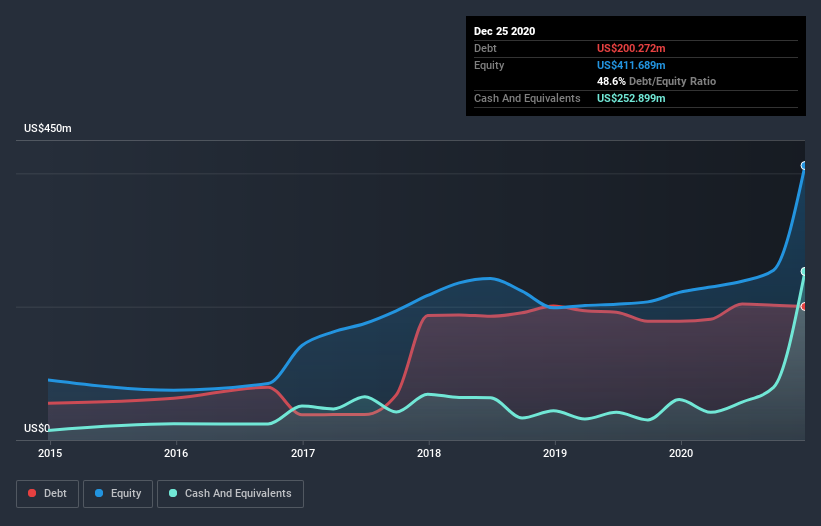Is Ichor Holdings (NASDAQ:ICHR) Using Too Much Debt?
Legendary fund manager Li Lu (who Charlie Munger backed) once said, 'The biggest investment risk is not the volatility of prices, but whether you will suffer a permanent loss of capital.' So it seems the smart money knows that debt - which is usually involved in bankruptcies - is a very important factor, when you assess how risky a company is. As with many other companies Ichor Holdings, Ltd. (NASDAQ:ICHR) makes use of debt. But is this debt a concern to shareholders?
Why Does Debt Bring Risk?
Debt is a tool to help businesses grow, but if a business is incapable of paying off its lenders, then it exists at their mercy. Ultimately, if the company can't fulfill its legal obligations to repay debt, shareholders could walk away with nothing. However, a more frequent (but still costly) occurrence is where a company must issue shares at bargain-basement prices, permanently diluting shareholders, just to shore up its balance sheet. Of course, plenty of companies use debt to fund growth, without any negative consequences. When we think about a company's use of debt, we first look at cash and debt together.
View our latest analysis for Ichor Holdings
What Is Ichor Holdings's Debt?
You can click the graphic below for the historical numbers, but it shows that as of December 2020 Ichor Holdings had US$200.3m of debt, an increase on US$178.1m, over one year. However, it does have US$252.9m in cash offsetting this, leading to net cash of US$52.6m.
A Look At Ichor Holdings' Liabilities
According to the last reported balance sheet, Ichor Holdings had liabilities of US$162.0m due within 12 months, and liabilities of US$200.4m due beyond 12 months. On the other hand, it had cash of US$252.9m and US$101.0m worth of receivables due within a year. So its liabilities total US$8.61m more than the combination of its cash and short-term receivables.
Having regard to Ichor Holdings' size, it seems that its liquid assets are well balanced with its total liabilities. So it's very unlikely that the US$1.74b company is short on cash, but still worth keeping an eye on the balance sheet. Despite its noteworthy liabilities, Ichor Holdings boasts net cash, so it's fair to say it does not have a heavy debt load!
Notably, Ichor Holdings's EBIT launched higher than Elon Musk, gaining a whopping 218% on last year. When analysing debt levels, the balance sheet is the obvious place to start. But ultimately the future profitability of the business will decide if Ichor Holdings can strengthen its balance sheet over time. So if you're focused on the future you can check out this free report showing analyst profit forecasts.
Finally, a business needs free cash flow to pay off debt; accounting profits just don't cut it. While Ichor Holdings has net cash on its balance sheet, it's still worth taking a look at its ability to convert earnings before interest and tax (EBIT) to free cash flow, to help us understand how quickly it is building (or eroding) that cash balance. During the last three years, Ichor Holdings generated free cash flow amounting to a very robust 86% of its EBIT, more than we'd expect. That positions it well to pay down debt if desirable to do so.
Summing up
While it is always sensible to look at a company's total liabilities, it is very reassuring that Ichor Holdings has US$52.6m in net cash. And it impressed us with free cash flow of US$28m, being 86% of its EBIT. So is Ichor Holdings's debt a risk? It doesn't seem so to us. When analysing debt levels, the balance sheet is the obvious place to start. But ultimately, every company can contain risks that exist outside of the balance sheet. Be aware that Ichor Holdings is showing 4 warning signs in our investment analysis , and 1 of those shouldn't be ignored...
If, after all that, you're more interested in a fast growing company with a rock-solid balance sheet, then check out our list of net cash growth stocks without delay.
This article by Simply Wall St is general in nature. It does not constitute a recommendation to buy or sell any stock, and does not take account of your objectives, or your financial situation. We aim to bring you long-term focused analysis driven by fundamental data. Note that our analysis may not factor in the latest price-sensitive company announcements or qualitative material. Simply Wall St has no position in any stocks mentioned.
Have feedback on this article? Concerned about the content? Get in touch with us directly. Alternatively, email editorial-team (at) simplywallst.com.

 Yahoo Finance
Yahoo Finance 
